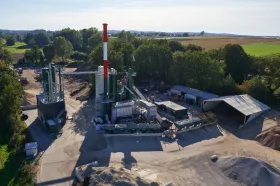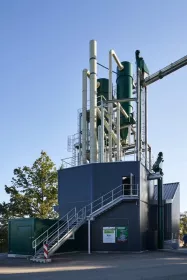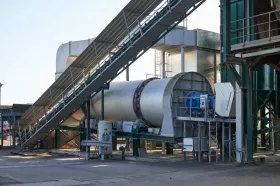
Wood Dust as an Energy Source
The asphalt mixing plant in Aichach was using around 600,000 l of heating oil to produce approx. 60,000 t of asphalt per year. That meant emissions of 1,800 t of CO₂. As an expert in multi-fuel burners, Benninghoven recognised the great future potential of wood dust as a fuel early on. The processing technology required for producing high quality wood dust was provided by a specialist company.
The endeavour was designed to be a research and development project from the outset. First of all, grant applications and the expert’s reports for fire safety, noise and emissions had to be obtained from the operator of the plant. This was followed by a lengthy approval process, as the authorities had no experience figures to fall back on.
Various requirements specified by the district administration had to be complied with, including continuous emissions measuring and the burner capacity. Taking into account the plant output, Benninghoven restricted the burner output to 12 MW/h. In the event of a future expansion of the plant, the burner has enough reserves to support the growth.

Cost Savings of 20% and Compliance with TA-Luft
All requirements centred around complying with the German TA-Luft regulation which came into force in 2021. Only four weeks after installation of the burner, the Benninghoven design engineers were able to achieve levels 50% below the requirements of TA-Luft in continuous emissions measurements. Measurements carried out by the TÜV inspection association confirmed these values. Benninghoven is the only manufacturer who meets and can therefore guarantee the limits for the plant with a wood dust burner.
For Christian Schweiger, contractor and operator of the mixing plant in Aichach, the investment has been worthwhile – also financially, as the carbon tax on fossil fuels has increased significantly. “At the start of the project, we assumed that sustainability will be an important topic for the future. The fact that we are already saving around 20% of costs due to the switch to wood dust was a pleasant surprise.”
The EVO JET: the Core

By extending the EVO JET multi-fuel burner to include wood dust as an energy source, Benninghoven has made it possible to utilise this sustainable fuel for use by its burners in asphalt mixing plants. Wood pellets, wood chips or wood dust are the raw materials. These have to be ground down to a defined particle size to ensure efficient heating. The wood dust is fed into the burner with precision dosing by means of the supply fan and the dosing unit.
Retrofit pays off
Since the switch to wood dust as an energy source, continuous emission measurements during operation show that the plant in Aichach consistently falls below the limits of the TA-Luft.
Benninghoven offers the EVO JET multi-fuel burner as a Retrofit retrofit solution with wood dust and with other energy sources. Changing out a burner takes no more than a week to complete. The economic and ecological optimisation of existing plants makes it possible even for owners of older asphalt mixing plants to take this important step to ensuring their competitiveness and future viability. A new Benninghoven burner can use up to four fuels at the same time. The energy source can be changed on the fly at the press of a button without the burner having to be shut down and restarted for the fuel change.
■


















